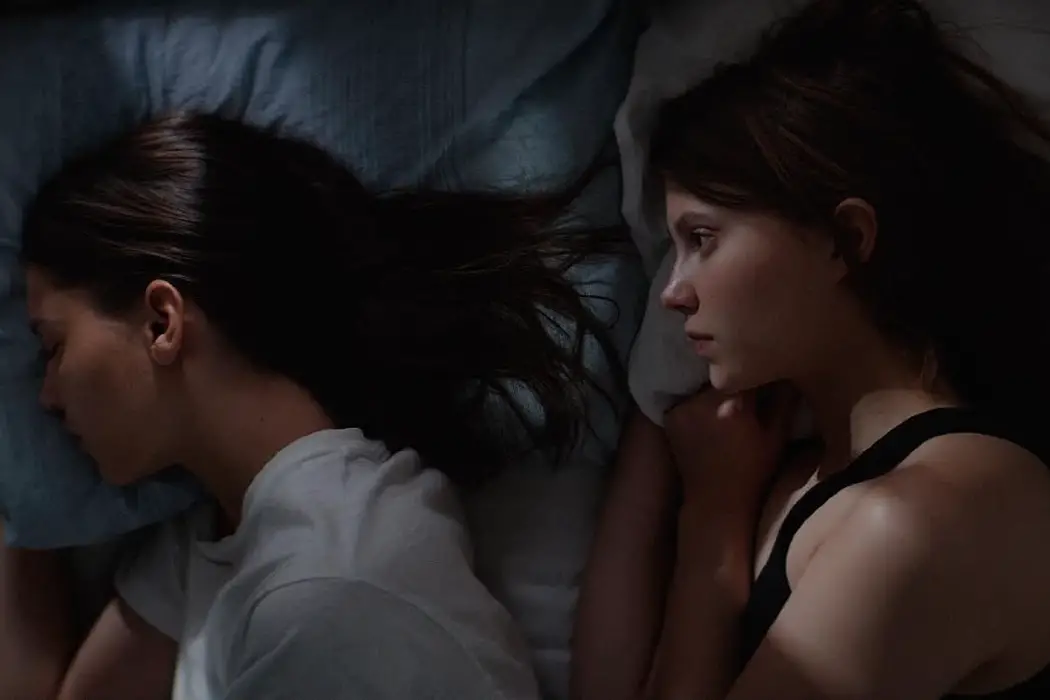THELMA: The Horror – And The Power – Of Finding Yourself

Lee Jutton has directed short films starring a killer toaster,…
The opening scene of Norwegian director Joachim Trier’s latest feature, Thelma, is one of the most chilling you will ever see, and one that perfectly sets the mood for the strikingly beautiful, supernatural coming-of-age story that is to follow. In it, a young girl follows her father out into the Norwegian woods for a hunting expedition.
The gorgeous yet desolate landscape is eerily quiet, as though the entire waking world has been muffled under a thick layer of snow; one senses that anything could happen out there and no one would ever know. The little girl spies a fawn through the trees and is enraptured by the wild animal – so enraptured that she doesn’t even notice when her father pulls out his gun and turns it on her instead of the fawn. Needless to say, the shivers that ran down my spine had nothing to do with the cold.

This is only one of the deliciously disturbing scenes that constitute the story of the titular protagonist of Thelma (Eili Harboe), who leaves the home of her overprotective Christian parents to study biology at a university in Oslo. One naturally discovers new sides of oneself after going away to college; without parents and other long-standing influences looming over you like a shadow, you can emerge into the light and discover what it is that you like, instead of what you’ve been lead to believe you like.
You can reinvent yourself without worrying about figures from your past breaking through and calling you a fraud. You can (hopefully) leave the parts of yourself you don’t like behind and replace them with new ones that you like much better. So Thelma tries to do, even with her parents obsessively calling her every day to check in, and calling her even more when she doesn’t pick up the phone.
Freshman Fits
Naive and trusting to a fault, Thelma is easily taken advantage of by her fellow students, who cannot wrap their minds around her sheltered upbringing. This culminates in one painfully embarrassing moment in which Thelma is tricked into thinking a cigarette at a party contains something much stronger than normal tobacco.
The scene that ensues will have a familiar echo to anyone who has ever gotten in over their heads in order to fit in with a more worldly crowd, anyone who has ever tried to be someone else and later regretted it. In these ways, Thelma is very much your standard coming-of-age-via-college story, as our heroine disobeys the orders of her strict teetotaling family to go out drinking with new friends, and starts pursuing an attractive student named Anja (Kaya Wilkins).

Yet as Thelma falls in love with Anja, she also finds herself stricken with bouts of terrifying seizures. The first episode comes upon her suddenly in the library when sitting next to Anja for the first time. As Thelma’s body starts to uncontrollably shake, black birds begin crashing into the large glass windows of the library.
The more Thelma succumbs to her seizures, the more birds repeatedly slam into the glass, the impact of their bodies becoming part of the soundtrack that scores Thelma’s attack. Are these seizures a symptom of a mysterious illness, the stress of starting college, or something altogether more sinister?
Beautiful Nightmares
Trier tells Thelma’s story primarily through images, rather than words – and what haunting images they are, reminiscent of such classic, freaky fantasias as Tarkovsky’s Stalker and Lynch’s Eraserhead. (One cannot give a film higher praise in the freaky imagery department than to compare it to the best of Tarkovsky and Lynch; trust me when I say that it is well deserved here.)
A glass window exploding inward seemingly of its own accord. A person catching fire on a boat in the middle of an empty lake. A snake winding itself around Thelma’s neck while she sits in the throes of fantasy. Trier particularly relies on using animals and other elements of nature to highlight the seemingly unnatural nature of Thelma’s newfound powers. For indeed, the seizures are symptomatic of something otherworldly awakening within Thelma.
Thelma’s seizures seem to coincide with her becoming overwhelmed with her desires, particularly those for Anja. In one particularly powerful scene, Thelma attends a wonderfully creepy modern dance performance with Anja and Anja’s mother. As the black-clad dancers – more demon than human – fling themselves around the stage to guttural, rhythmic music, Anja’s hand slowly edges its way across Thelma’s thigh.
The film cuts between the increasingly intense performance and Thelma’s increasingly frantic face as she feels her body begin to twitch and convulse under Anja’s touch. The entire scene is a masterful example of how all of the elements of film – acting, camera, design, editing and sound – can come together perfectly and wholly swallow up the audience.

One of the most powerful images at Trier’s disposal is the elegant and expressive face of his star; Harboe’s wide-eyed beauty manages to somehow make her look both like an alien and an average college girl at the same time. Her performance embodies the fear and uncertainty that comes with growing up, and the empowerment that comes with finally finding yourself.
One minute, Thelma seems like a sweet, innocent girl with a sickness she doesn’t understand; the next, she is a powerful woman capable of making her deepest desires come true merely by thinking about them. Is Anja’s attraction to Thelma genuine, or just the result of Thelma’s powers making her desire for Anja a reality? This is just one of the mysteries explored in Thelma. And while the audience isn’t given all of the answers by the time the credits roll, the film’s enigmatic ending should leave you feeling satisfied.
Thelma: Conclusion
If you saw Lady Bird and enjoyed its incredibly genuine depiction of the female coming-of-age experience, but wished the main character was a Norwegian girl with supernatural powers instead of a punk kid from Sacramento, then Thelma is the film for you.
In all seriousness, though, Thelma’s depiction of the emotional throes one goes through while growing up rings just as true as Greta Gerwig’s Lady Bird, even with (or perhaps because of) all the nightmarish trappings.
What do you think? Does Thelma sound more your speed than Lady Bird? Or are you just tired of coming-of-age stories on film?
Thelma was released in the UK on November 3, 2017 and in the U.S. on November 10, 2017. You can find more international release dates here.
Does content like this matter to you?
Become a Member and support film journalism. Unlock access to all of Film Inquiry`s great articles. Join a community of like-minded readers who are passionate about cinema - get access to our private members Network, give back to independent filmmakers, and more.
Lee Jutton has directed short films starring a killer toaster, a killer Christmas tree, and a not-killer leopard. Her writing has appeared in publications such as Film School Rejects, Bitch: A Feminist Response to Pop Culture, Bitch Flicks, TV Fanatic, and Just Press Play. When not watching, making, or writing about films, she can usually be found on Twitter obsessing over soccer, BTS, and her cat.













